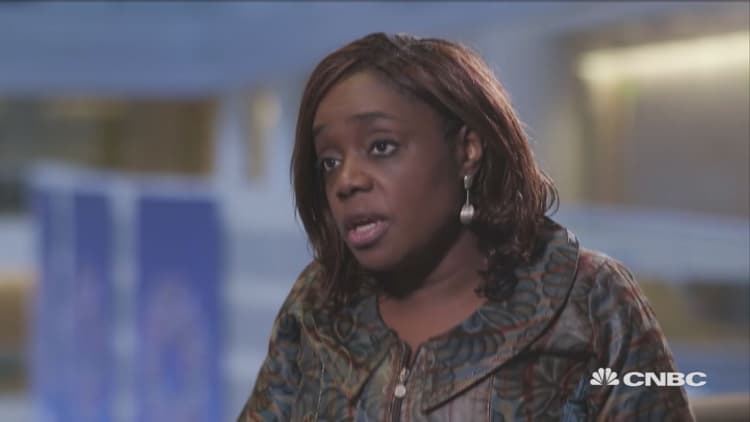Rising oil production in Libya and Nigeria is raising concerns about OPEC's ability to boost crude prices, but conflicts in the two nations may still keep a lid on their output.
Both OPEC members are exempt from the cartel's deal to remove 1.2 million barrels a day from the oil market in the first six months of this year. But with OPEC poised to extend the agreement at least through the rest of 2017, the conflicts that sidelined Libyan and Nigerian crude supplies appear to be easing.
Libya's output rose above 800,000 barrels a day for the first time since 2014, when a second civil war broke out, the country's National Oil Corp. reported last week. Meanwhile, Nigeria is restoring major infrastructure damaged in militant attacks that nearly halved its output last year.
Goldman Sachs said rising Libyan and Nigerian production is one factor that is capping oil price gains, even as top producers Saudi Arabia and Russia push to extend OPEC's output cuts into 2018.
"While we remain cautious on factoring in such a recovery in production given the ongoing local tensions, these combined volumes could largely offset the benefit of the extended cuts," the bank said in a research note.
The International Energy Agency, a Paris-based energy advisor, issued a similar warning on Tuesday, saying "any significant increase" in Libya and Nigeria production "clearly offsets cutbacks by other OPEC and non-OPEC countries."
Libya: Negotiation, but no peace
The outlook for Libyan supply improved this month after the leader of the country's internationally recognized government and a rival commander whose forces control the country's northeast met to sketch out a power-sharing agreement.
In a positive sign, Egypt appears to have pushed its ally General Khalifa Haftar to meet with UN-backed Prime Minister Fayez al Sarraj. This shows Cairo is committed to promoting stability next door, even if a resolution forces Haftar to make concessions, the Eurasia Group said in a briefing.
But the risk consultancy believes it will be difficult to secure a lasting peace deal in the next six months. A bitter dispute over Haftar's role in Libya's political future is one obstacle. Progress is also being hampered by a disjointed diplomatic push by international players and disputes within the United Nations' Libya mission, the Eurasia Group said.
As a result, the firm projects oil exports will fluctuate between 500,000 and 700,000 barrels a day for the remainder of 2017. While Haftar's firm grip over oil supplies in Libya's eastern region will limit the risk that output will plummet, funding problems and a shortage of foreign workers at the National Oil Corp. will cap production gains, the Eurasia Group concluded.
RBC Capital Markets believes geopolitical risks remain high in Libya, in part because the Islamic State considers it a fallback option as the militant group loses ground in its Syrian and Iraqi strongholds. The CIA said last year that ISIS has 6,000 to 8,000 fighters in Libya.
Nigeria's mysterious militants go radio silent
In Nigeria, a wave of attacks on oil infrastructure claimed by a clandestine group known as the Niger Delta Avengers have ceased, allowing major pipelines to begin pumping crude again.
The peace that has taken hold is fragile though, warned Manji Cheto, senior vice president covering West Africa at risk advisory Teneo Intelligence. It rests largely on negotiations between elders in the oil-rich southern delta and Nigerian Vice President Yemi Osinbajo, a southerner who is leading the federal delegation to the impoverished and pollution-ravaged region.

The militants, who demanded a larger share of the nation's oil wealth for people in the delta, now feel they have a voice in the capitol, Cheto said. Simultaneously, the nonmilitary approach used by Osinbajo, which includes promises of development money, has undercut the case for militancy.
But Nigerian President Muhammadu Buhari has been abroad for much of the year receiving treatment for an undisclosed illness. That creates a political opportunity for vested interests in Buhari's inner circle, who are uncomfortable with the northern-born president's relatively close relationship with his deputy, Cheto said. This could undermine militants' trust in the capital to the extent Osinbajo is marginalized.
In Cheto's worst-case scenario, an ailing Buhari steps down and his aides push out Osinbajo, severing the militants' link to the government and sparking renewed attacks on oil infrastructure.
"At the moment it would be very difficult, but not impossible. I can't see a path to that kind of outcome, but this is Nigeria," she said.
RBC Capital Markets lists Nigeria at its highest geopolitical risk level, due to "the potential for a turbulent political transition."
Exemptions continue?
Despite concerns about growing oil supply, there is no sign yet that OPEC will push Libya and Nigeria to turn off the tap when they meet next week.
The cartel could seek a production cap similar to that given to Iran, which is allowed to raise output to a certain level as it rebuilds its energy industry after years of crippling sanctions.
Nigeria's oil minister said in January that his country would consider reductions once its output returns to 1.8 million barrels a day, though he did not say how deeply it would cut.
"It remains to be seen whether there's political will behind that," Cheto said. "A lot of that will depend on whether Buhari consents to it."


